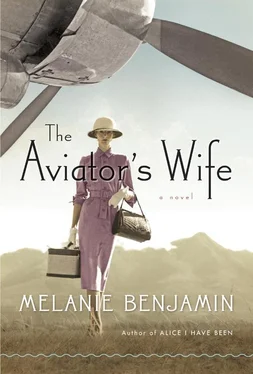Melanie Benjamin
THE AVIATOR’S WIFE
“But the eyes are blind.
One must look with the heart.”
—ANTOINE DE SAINT-EXUPÉRY
HE IS FLYING.
Is this how I will remember him? As I watch him lying vanquished, defeated by the one thing even he could not outmaneuver, I understand that I will have to choose my memories carefully now. There are simply too many. Faded newspaper articles, more medals and trophies than I know what to do with; personal letters from presidents, kings, dictators. Books, movies, plays about him and his accomplishments; schools and institutions proudly bearing his name.
Tearstained photographs of a child with blond curls, blue eyes, and a deep cleft in his chin. Smudged copies of letters to other women, tucked away in my purse.
I stir in my seat, trying not to disturb him; I need him to sleep, to restore, because of all the things I have to say to him later, and we’re running out of time. I feel it in my very bones, this ebbing of our tide, and there’s nothing I can do about it and I’m no longer content simply to watch it, watch him rush away from me, leaving me alone, not knowing, never knowing. My hands clenched, my jaw so rigid it aches, I lean forward as if I could will the plane to fly faster.
A stewardess peeks over the curtain separating us from the rest of the passengers.
“Is there anything I can do?”
I shake my head, and she retreats after one worried, worshipful look at the emaciated figure breathing raspily, eyelids flickering as if he’s still searching, still vigilant, even in his drugged sleep. And knowing him, he probably is.
Still the unanswered questions, so many I can’t gather them to me in any order, in any list, oh, his damned, disciplined lists ! Now, finally, I have need for one and I can’t even pick which question with which to start. So many demand answers. Why them? Why all of them? Did he love them? Has he ever loved me?
Have I always loved him? I left him once, long ago. So long ago but I can still remember the color of the suitcase I was carrying, the shoes I was wearing when I walked out the door. The same pair of shoes I was wearing when I came back. Has he ever suspected that he almost lost me then? Is that why he has betrayed us all?
I yearn to shake him awake, make him tell me, but I can’t, not yet. So I force myself to focus on the one question only I will be able to answer. I will leave the rest for later. After we land; after our children have said all they need to.
After only I am left.
Sipping some tepid water, I look out the window and ponder, once more, how to remember this man who was never merely a man, least of all to me. We are above the clouds now, winging our way west across the continent.
Flying .
He is forever captured in photographs and newsreels waving jauntily from the cockpit, lean and bronze in his oversized flying suit, his sandy hair cut so short, boyish Buster Brown bangs in front, his neck shaved in back. Or he is leaning casually against his plane— the plane, the one of which he always spoke so reverently that I knew it was a part of him in a way, it turned out, I could never be. That single engine monoplane, the Spirit of St. Louis .
Even now, I think of flying as a refuge; gliding with the birds on the currents, the sky a great silent cathedral surrounding you. And although I know differently—my ears sometimes ring with the memory of the roaring of those early engines—I imagine him crossing that ocean in silence, a young man, his hand on the control stick and his foot on the rudder, alone with just his thoughts; for the first and only time in his life, free from expectation. Free from the burden of living up to the legend that awaits him a mere twenty or so hours away, in a primitive airfield just outside of Paris.
And if I finally choose to remember him like this, will I see his face? Or will I be seated behind him, as I was so many times, so that I can see only the fine, reddish-blond hairs that the razor didn’t quite reach, his neck straining forward in a taut column of concentration? Will I recognize his shoulders, broad and tense beneath that bulky flight suit?
It will not be him flying, then; it will be us . Somehow, I will be in the tiny cockpit of the Spirit of St. Louis with him, a fly on history’s shoulder.
No. Abruptly, I tug down the blind so that I can no longer look down upon the clouds. No . He should soar alone across the ocean that first time, just like in the history books, and he should be young and he should be boyish and his entire future, unimaginable, unsullied, should be his only passenger.
Despite all the pain, the bitterness, the betrayal—his and mine, both—I pray to the God of my childhood that this is how, finally, I will remember him. An intense yet hopeful figure so finely chiseled he is almost part of the machinery of the plane itself, willing it across the ocean with a couple of sandwiches, a thermos of coffee, and unwarranted arrogance. His blue eyes will glint like the sun on the ocean that is so close outside the cockpit window he can almost touch it. Everything will be ahead of him, including—especially—me.
Only he won’t know it yet. And so he’ll soar toward us all, so innocent he is still capable of capturing, and breaking, my heart.
CHAPTER 1

December 1927
DOWN TO EARTH.
I repeated the phrase to myself, whispering it in wonder. Down to earth . What a plodding expression, really, when you considered it—I couldn’t help but think of muddy fields and wheel ruts and worms—yet people always meant it as a compliment.
“‘Down to earth’—did you hear that, Elisabeth? Can you believe Daddy would say that about an aviator , of all people?”
“I doubt he even realized what he was saying,” my sister murmured as she scribbled furiously on her lap desk, despite the rocking motion of the train. “Now, Anne, dear, if you’d just let me finish this letter…”
“Of course he didn’t,” I persisted, refusing to be ignored. This was the third letter she’d written today! “Daddy never does know what he’s saying, which is why I love him. But honestly, that’s what his letter said—‘I do hope you can meet Colonel Lindbergh. He’s so down to earth!’ ”
“Well, Daddy is quite taken with the colonel….”
“Oh, I know—and I didn’t mean to criticize him! I was just thinking out loud. I wouldn’t say anything like that in person.” Suddenly my mood shifted, as it always seemed to do whenever I was with my family. Away from them, I could be confident, almost careless, with my words and ideas. Once, someone even called me vivacious (although to be honest, he was a college freshman intoxicated by bathtub gin and his first whiff of expensive perfume).
Whenever my immediate family gathered, however, it took me a while to relax, to reacquaint myself with the rhythm of speech and good-natured joshing that they seemed to fall into so readily. I imagined that they carried it with them, even when we were all scattered; I fancied each one of them humming the tune of this family symphony in their heads as they went about their busy lives.
Like so many other family traits—the famous Morrow sense of humor, for instance—the musical gene appeared to have skipped me. So it always took me longer to remember my part in this domestic song and dance. I’d been traveling with my sister and brother on this Mexican-bound train for a week, and still I felt tongue-tied and shy. Particularly around Dwight, now a senior at Groton; my brother had grown paler, prone to strange laughing fits, almost reverting to childhood at times, even as physically he was fast maturing into a carbon copy of our father.
Читать дальше














